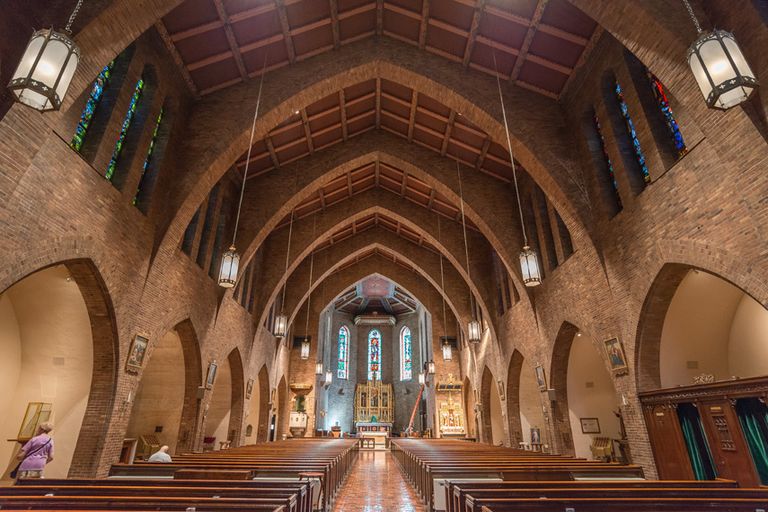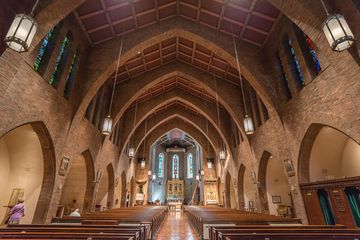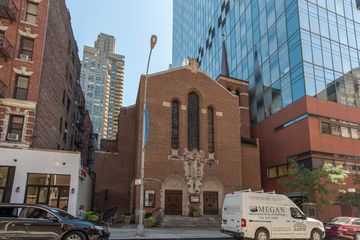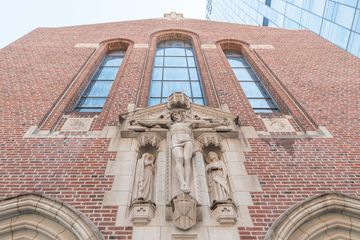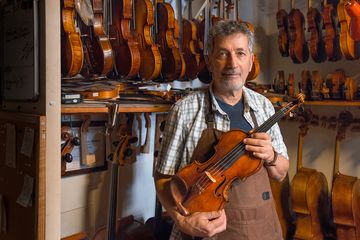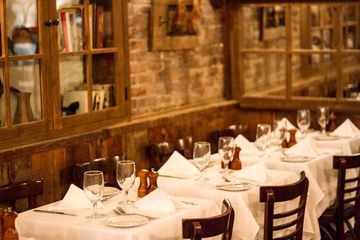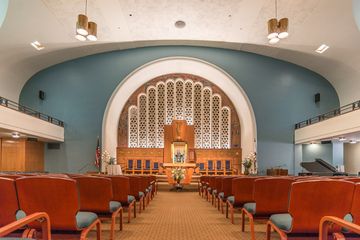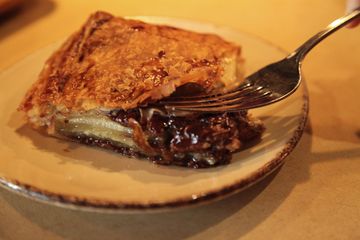As a rule, I am not as big a fan of dessert as I am of the pasta entrees in most Italian restaurants. That said, I could not stop myself from eating the "Nutellasagna" at Joanne Trattoria. However, even better than this warm oozing dessert with homemade flaky pastry dough, was listening to the fascinating story of Travis Jones, the executive chef and bakeshop master. Upon entering Joanne's, Travis greeted members of the Manhattan Sideways team and sat down with us in the outdoor courtyard, where trees twisted along the brick walls. We learned that Cynthia Germanotta, co-owner with her husband Joe, had done all of the decorating herself. If the name "Germanotta" sounds familiar, it is because the restaurant is owned by the parents of Stefani Germanotta, who is more commonly known as Lady Gaga. Travis explained that though some of Lady Gaga's fans, affectionately named "Little Monsters, " come and make lasting connections with other like-minded diners, many parties do not even realize where they are eating. Except for a "Lady Gaga" license plate tucked away in a corner, a few photos on the wall and some Gaga-themed drinks (including Gaga wine, only available at Joanne's), her stage persona does not play a large part in the restaurant. Rather, the main goal of the trattoria is to create a comfortable and warm environment. Joe named the restaurant after his sister, who died of Lupus at the age of nineteen, and so rather than focusing on Lady Gaga's celebrity, the restaurant emphasizes the closeness and strength of an Italian family. Travis's story of how he became Joanne's executive chef is unlike any story I have heard in the culinary world. Instead of working his way up the restaurant ladder, from busboy to chef, as the story often goes, Travis' adult life started in the U. S. Navy. He spent nine-and-a-half years as a weapons technician, during which time he traveled around the world and formed a lasting brotherhood with his fellow sailors. Travis told us that he has always loved preparing food, and would often cook for his Navy buddies. His affection for the culinary world began earlier still, in his childhood, when he would spend every summer with his grandparents on their farm in the Midwest, learning how to gather fresh eggs, make bread, go fishing, and hunt raccoons. His grandparents taught him that everything he hunted, fished, or harvested, he had to eat, which instilled in him the value of sustainability. His grandmother also taught him the love of baking, which has become his greatest passion. "Desserts are my thing, " he said, and added with a twinkle in his eye, "I also love to eat them. "After leaving the Navy, Travis went to Johnson and Wales culinary school in Providence, Rhode Island. "It was a culture shock, " Travis said, to go straight from the Navy to the restaurant world. His first summer internship he spent working under Chef Art Smith in Chicago. Later, when Travis was back at culinary school, he received a call from Chef Smith, who asked him to come and help out at a recently opened restaurant on 68th - Travis got permission to leave school, temporarily, and began working at Joanne's. He has never left since joining the team in 2012. Travis only interned at the front of the house for four weeks before the general manager left, and he took over. Travis continued his story by explaining that the main turning point in his career came during Hurricane Sandy, when very few of the staff was able to come in. Travis cooked in the kitchen with Joe while Cynthia hosted. They only had hamburgers in stock, and, thus, that was all they could make. Travis proved his talent and resourcefulness, and took over as executive chef not long after, which he said was surreal: "I was still a student, theoretically, interning, but running a restaurant that had been on the front page of the New York Times. " Travis still has a trimester left in order to receive his degree, which he is finishing online. "Just because I'm already an executive chef doesn't mean I don't want my Bachelor's Degree, " he assured us, adding that he would be one of only two people in his family to have completed a college education. He is working towards degrees in Food Service Management and Event and Entertainment Management. Travis immediately got to work improving the menu at Joanne's. He added fresh, handmade pasta, "which is part of the reason for my arthritis, " he joked, and made the "ginormous" Germanotta family meatballs a little smaller and more manageable. He also added a short rib ragout, which some of us had the pleasure of sampling. Travis whipped it up in the open kitchen, dipping into the huge vat of red sauce, made using a secret Germanotta family recipe. He explained that the ragout sits for a couple of hours in a red wine sauce with garlic, carrots, oregano, and other fresh ingredients. Olivia, a member of the Manhattan Sideways team, ate it with gusto and described it as being "like a warm hug from an Italian grandmother. "Travis then brought out a tray of desserts, and explained that once he got the savory food in order, he started "Joanne's Bakeshop. " Along with the Nutellasagna, we tasted a homemade tiramisu and a delectable almond cake with fresh raspberries. I then asked if Travis's grandmother, the woman who is credited for his love for cooking, had a chance to visit the restaurant before she passed away. Though the answer was sadly no, he noted, "I shipped her cakes and pies whenever I could. "
